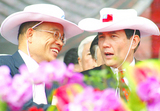President Chen Shui-bian is very keen on constitutional reform. He regularly talks about it being vital for the future development of Taiwan, and a cornerstone of his presidency. This in itself means that the pan-Blue opposition parties will make very sure that he won’t be able to reform the constitution again during his presidency.
So if constitutional reform is a non-starter, then what about other reforms? The latest drive against corruption by the government is just such a reform:
The Democratic Progressive Party Cabinet yesterday approved a draft bill to establish a new agency to curb political corruption under the Ministry of Justice and submitted it to the Legislative Yuan for approval.
Executive Yuan Secretary-General Cho Jung-tai (卓榮泰) told The Taiwan News that the Cabinet submitted the bill in response to a call by President Chen Shui-bian (陳水扁) earlier this month to respond to concerns in society about the governing party and corruption by intensifying reform and moving to ensure cleaner politics and government.
…
The draft bill mandates that the proposed new bureau would be responsible for the investigation and handling of cases of suspected crimes of graft and corruption and other issues related to clean politics and government.
All very worthy and commendable. It is undeniable that there is (and always has been) corruption in the various layers of govnerment, and having a body tasked with stamping this out is a popular move. There was only one major complaint about the idea, from Judicial Reform Alliance Executive Director Kao Yung-cheng:
“It would be better to integrate anti-corruption responsibilities at a higher level agency, such as an anti-corruption administration, that would be independent from the executive system and have judicial investigative powers or by bolstering the powers of the Ministry of Justice Investigation Bureau to investigate economic crimes and make the MJIB more transparent,” said Kao.
Hmm … A high level body, independent of the Executive Yuan, whose role is to investigate corruption and other illegal activities by government officials. An interesting concept,which raises a question that i’ve often wondered about: Has noone in government actually read the constitution? Here’s a few relevent articles:
Article 90
The Control Yuan shall be the highest control organ of the State. It shall exercise the powers of consent, impeachment, censure, and auditing.Article 95
In exercising its power of control, the Control Yuan may request the Executive Yuan and its Ministries and Commissions to make available to it any orders they have issued and all other relevant documents.Article 96
The Control Yuan may, according to the work of the Executive Yuan and its Ministries and Commissions, set up a number of committees to look into all aspects of their activities to see whether there is any violation of law or dereliction of duty.
So in summary: To fight corruption, the government plans on setting up a body whose responsibility is exactly covered by an existing (but largely ignored, and currently defunct) branch of government – except that this new body will have less independence and authority than the current body. What a great step forward.
Update: Inspired by this DPP initiative, the PFP have come up with their own anti-corruption plan:
The People First Party (PFP) caucus yesterday proposed amending the law to empower lawmakers to exercise the right of investigation, including summoning the president, in order to probe the Kaohsiung Rapid Transit Corp (KRTC) scandal.
At least with this daft idea some lawmakers did actually mention the constitution and point out the principle of separation of powers among branches of government.
Why do I get the feeling that in a couple of years we’ll have more ‘anti-corruption bodies’ than you could shake a stick at (and as a direct result, more corruption)?

 Taiwan has an interesting relationship with its national flag. The Republic of China flag of course represents the whole of China, rather than just Taiwan – and so many regard it as an anachronism, and the more independence-minded would love to replace it. Of course, the fact that the main feature of the flag (the blue and white sun) is taken from the KMT’s party logo also means that feelings are split down party lines: KMT supporters are fierce supporters of the flag, while DPP supporters are less enamored with it.
Taiwan has an interesting relationship with its national flag. The Republic of China flag of course represents the whole of China, rather than just Taiwan – and so many regard it as an anachronism, and the more independence-minded would love to replace it. Of course, the fact that the main feature of the flag (the blue and white sun) is taken from the KMT’s party logo also means that feelings are split down party lines: KMT supporters are fierce supporters of the flag, while DPP supporters are less enamored with it. Yesterday’s fights in the Legislature plumbed new depths of moronic and loutish behaviour with
Yesterday’s fights in the Legislature plumbed new depths of moronic and loutish behaviour with